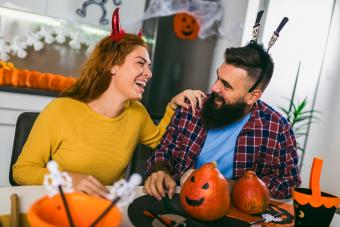
Is Halloween a pagan holiday? No! Although Halloween has roots in Samhain, an ancient pagan festival, and shares some similarities, they are not the same. Modern-day pagans around the world still celebrate Samhain. They gather each year on October 31st to observe its rituals and traditions.
Halloween's Pagan Origin
Halloween, as the world knows it, owes a debt to the Celtic culture in Ireland, Britain, and Northern Europe. The more frightening symbols of Halloween have their roots in Samhain, a pagan festival that honors the dead. Samhain, pronounced “sow-win,” is a Gaelic word that means “summer’s end.” Samhain was the end of the year for the Celts. Harvest was over, and the coldest, darkest, and most frightening part of their new year was beginning.
The Wheel of the Year
The Wheel of the Year represents the eight pagan holidays that celebrate life's seasons and cycles. On this ever-turning wheel, Samhain, a cross-quarter day, falls halfway between the summer equinox and winter solstice. On the Georgian calendar, Samhain occurs from October 31st to November 1st. Of course, the Celts lived in agricultural communities, and their lives were tied to nature's cycle. So, Samhain was most likely celebrated when the last harvest came in, no matter the date. Ancient Samhain celebrations lasted for days, if not the entire month.
Samhain Traditions, Folklore, and Myths
Every year in late October, families would bring in the last of their harvest and attend the Samhain festival. Home hearth fires were left to burn out while villagers joined with Druid priests to light a community fire using a wheel representing the sun to cause friction and spark flames. The fire needed to be started with friction because it was believed that such a "force-fire" would ward off bewitching and terrifying plagues. Sacrifices were made, and everyone took a flame from the sacred bonfire back to their home to relight their hearth.
Festival of the Dead
A belief arose that Samhain was also a time when the spirits of one's dead ancestors had easy access to the world and that the souls of the dead roamed the villages and streets. Home doors were left open in hopes that spirits of loved ones might join them around their hearths. Still, not all spirits were thought to be friendly. Gifts and treats were left out to pacify these evil spirits in hopes that the following year's crops would be plentiful.
Folklore and Myths
Many Celtic folk stories are set during Samhain. These stories involve death and other macabre and dangerous happenings. Due to these eerie tales, supernatural forces became associated with the festival. Fairies and sidhs, for instance, were said to be especially active during Samhain. The Celts believed if they dressed as animals and monsters, fairies would not be tempted to kidnap them. Some specific Halloween monsters have been associated with the mythology surrounding Samhain.
- A shape-shifting creature named Púca creates mayhem and is known to be a prankster.
- The Banshee was a weeping woman that brought death.
- A headless woman dressed in white called Lady Gwyn, accompanied by a black pig, chases nighttime wanderers.
- The Dullahan, who appeared as headless men carrying their heads and riding flame-eyed horses, was a death omen to anyone who encountered them.
- The Faery Host was a group of hunters who haunted Samhain and kidnapped people.
- The Sluagh came from the west and entered homes to steal souls.
Renaming Samhain
Many Celtic traditions were incorporated into Christianity, and Samhain was among the most popular. Since the Celts honored their dead relatives on Samhain, the Catholic Church decided to make November 1st All Saints' Day and November 2nd All Souls' Day. In time, the night before All Saints' Day (October 31st) was given a Christian name. It became All Hallows' Eve, the classic Christian name for what is known as Halloween.
Modern Halloween
Like Samhain, Halloween is filled with tales of ghosts, goblins, symbols of death, and costumes. Still, to be very clear, Halloween is not a pagan holiday. It's not the same as the Celtic Samhain festival or any other harvest or religious celebration. Just as the name Halloween has evolved, so have holidays held at harvest time. Halloween is a secular holiday filled with candy, costumes, trick-or-treating, parties, merriment, and mischief, and Halloween celebrations are growing around the world.







